
For 2024, the main work of the Justice & Civic Engagement Committee is centered on the theme of VOTING: OUR CONSTITUTIONAL RIGHTS AND RESPONSIBILITIES.
In various projects and activities detailed below, the committee’s work will focus on issues and activities related to protecting voter rights, mobilizing voter empowerment and voter registration, JusticeAid’s Black Voters Matter initiative, Gerrymandering, and others in development.
ClassACT Newsletter and Bulletin Articles, Projects, Bridges, and Forums and classmate spotlights in the Justice and Civic Engagement area appear below. Please click on those that interest you.
The Justice & Civic Engagement Committee (see side column) meets at least quarterly, with individual sub-committee meetings scheduled as needed per project.
If you would like to work with us on any of these endeavors, join the Justice & Civic Engagement committee, or have questions about them, we invite you to email us at classacthr73@gmail.com or contact Justice & Civic Engagement Co-Chairs Therese Steiner or Bahman Mossavar-Rahmani.
 SEPTEMBER 2024 CLASSACTIONS NEWSLETTER SEPTEMBER 2024 CLASSACTIONS NEWSLETTER
SPECIAL EDITION: DEMOCRACY
During this pivotal moment for our country, we in ClassACT HR73 have been working to encourage our classmates and readers to join in efforts to get out the vote for national, state and local elections this November. We believe that supporting free and fair elections is one of our primary responsibilities as citizens of this great nation. In this spirit, we have devoted the September edition of our ClassACTions newsletter to reflecting on how our love of Democracy informs so many of our endeavors. We also offer ways for you to help others to exercise their constitutional right to vote and fulfill their responsibility.
Read here.
VOTING ACTIVISM OPPORTUNITIES
This is a group of classmates who have focused on a multi-pronged approach, including projects around protecting voter rights, gerrymandering, and, eventually, civics education. Because of ClassACT’s 501(c)(3) non-profit status, we have only listed groups that are non-partisan, though some organizations may be 501(c)(4) entities to which donations are not tax-deductible. Leads: Marilyn Go, Jim Harbison, Ryan O’Connell
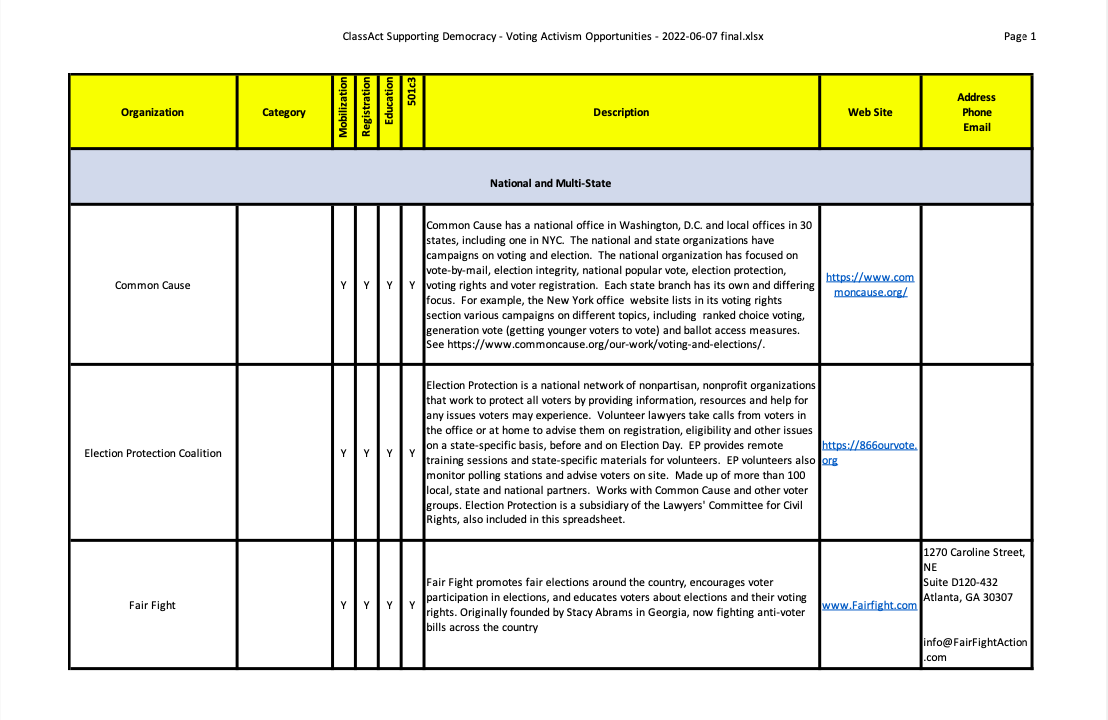
CLICK TO READ PDF
VOTING: OUR CONSTITUTIONAL RIGHTS AND RESPONSIBILITIES ARTICLES
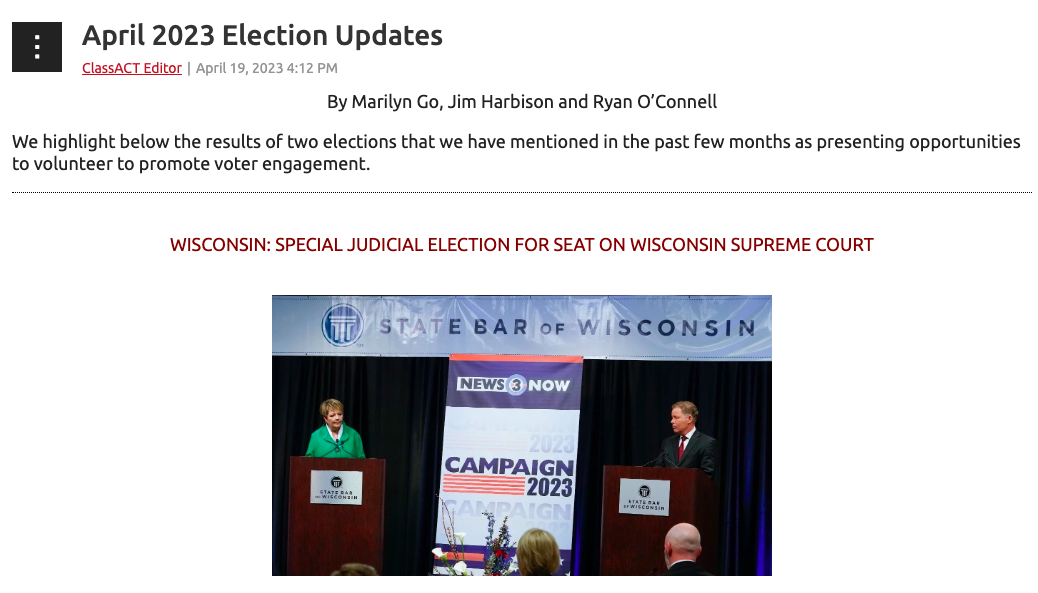
Members of the Justice & Civic Engagement Committee regularly contribute and edit articles on related to timely issues related on voting protection in various states to the ClassACT HR73 Newsletters. Links to recent articles below. Leads: Marilyn Go, Jim Harbison, Ryan O'Connell, Jacki Swearingen
-
August 13, 2024 12:02 PM
-
June 14, 2024 5:11 PM
-
May 13, 2024 1:17 PM

CLASSACT FORUM
VOTER SUPPRESSION: A CANCER ON OUR BODY POLITIC
The elimination of many polling places. The cancellation of early voting. The intimidation at the polls of voters and election workers. These are just a few of the signs of voter suppression that have sprouted in recent years as some members of the electorate attempt to attain or to hold on to power by preventing those they regard as potential opponents from voting.
ClassACT HR73 hosted the forum “Voter Suppression: A Cancer in Our Body Politic” on September 12th, 2022. The forum brought together journalists, activists and experts concerned with election integrity to discuss how repressing voting threatens our democracy. Class of 1973’s own E.J. Dionne, the renowned Washington Post columnist, moderated a panel that included Congressman Joaquin Castro HLS '00, the Congressman for the 20th District of Texas, Cecile Scoon ’81, President of the League of Women Voters of Florida, Michael Waldman, President of the Brennan Center for Justice at NYU Law School, and Samuel Spital '00, HLS '04, the Director of Litigation at the NAACP Legal Defense & Educational Fund, Inc. LEARN MORE

 GERRYMANDERING: OUR DEMOCRACY AT RISK GERRYMANDERING: OUR DEMOCRACY AT RISK
ClassACT HR73 is pleased to present its primer on gerrymandering: Gerrymandering: Our Democracy at Risk.” Written by James P. Harbison and J. Ryan O’Connell with editing by Sallie Gouverneur, the primer is a product of ClassACT HR73’s Justice & Civic Engagement Initiative. Through this initiative, ClassACT has already hosted forums addressing issues such as voter suppression, racism and social justice, and racism in the criminal justice system.
Gerrymandering is one of the gravest, most insidious threats to our democracy, and the potential for abuse is soaring. When politicians draw voting maps to favor their party’s candidates over their opponents, that undermines the power of elections in our system of government…and citizens’ faith in our republic. A legislature should be a mirror image of its voters, so lawmakers reflect their constituents’ views, but gerrymandering prevents that.
Gerrymandering makes campaigns less competitive. With safe seats, incumbents can cater to their party’s members and ignore voters from the other party. Lawmakers are less inclined to compromise, which can lead to gridlock.
As a result of the 2020 census, officials in all 50 states have drawn up the voting maps that will govern elections for the next 10 years. With cheap, powerful computer programs, it’s easy for politicians to slice and dice voting districts to their hearts’ content…unless concerned citizens like you get involved and stop them.
“Gerrymandering: Our Democracy at Risk” will show you how to stop lawmakers from gaming the map-drawing process. We’ve written this primer for all Americans, regardless of political affiliation, who want elections to be fair and their votes to count. Politicians from both major parties have succumbed to the temptations of gerrymandering.
GERRYMANDERING: OUR DEMOCRACY AT RISK PRIMER
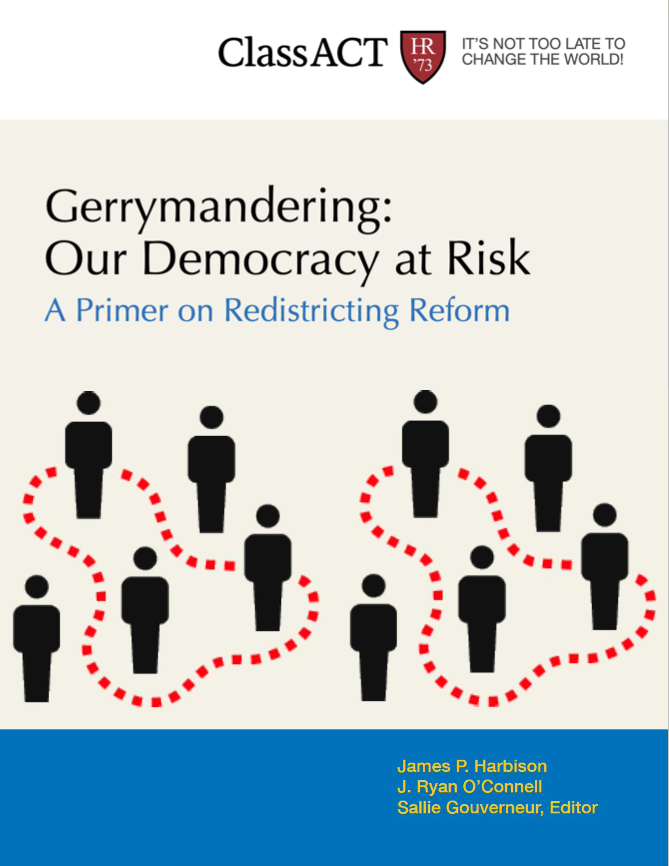
CLICK TO READ
The primer explains:
- What techniques politicians use to draw maps unfairly
- Which states are the most highly gerrymandered
- What are the best solutions for ensuring fair elections
- How you can help to fight gerrymandering
We urge you to share this primer with your friends, communities and educational institutions. If you have questions about the primer or how to share it with others, please contact Ryan O’Connell.
SUMMARY OF THE GERRYMANDERING PRIMER
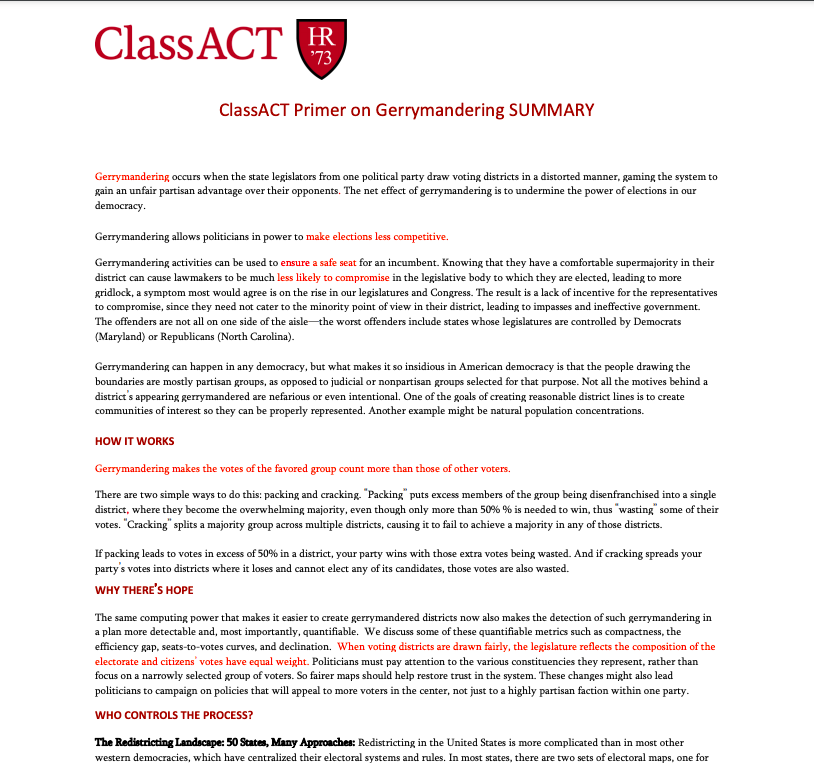
CLICK TO READ

CLASSACT FORUM GERRYMANDERING: OUR DEMOCRACY AT RISK
Moderator Ryan O’Connell HR'73, one of the authors of a new ClassACT primer Gerrymandering: Our Democracy at Risk, led a panel of experts on reforming redistricting. The panelists included Alicia Bannon, Managing Director, Brennan Center for Justice at New York University; Brian Cannon, Director of Campaigns at the Institute for Political Innovation and former Executive Director of OneVirginia2021; Jim Harbison HR'73, PhD ’77, former physicist and computer scientist at Bell Labs and IBM, now focused on the mechanics and mathematics underlying gerrymandering; and Michael Li, Senior Counsel, Brennan Center for Justice. This Forum was developed by our gerrymandering subcommittee, led by Bahman Mossavar Rahmani '73, co-chair of ClassACT's Justice & Civic Engagement Initiative.
LEARN MORE
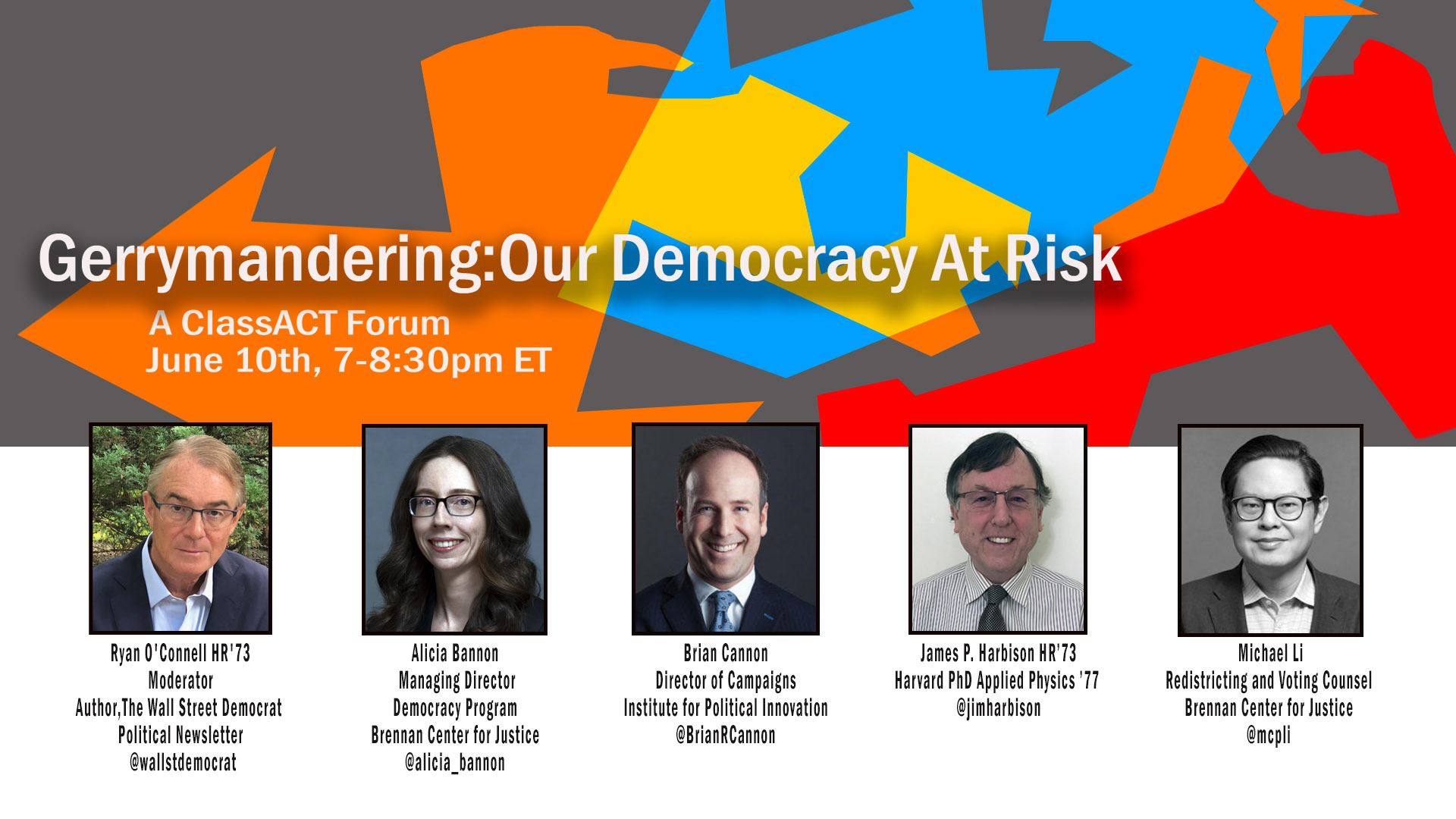
| | |










